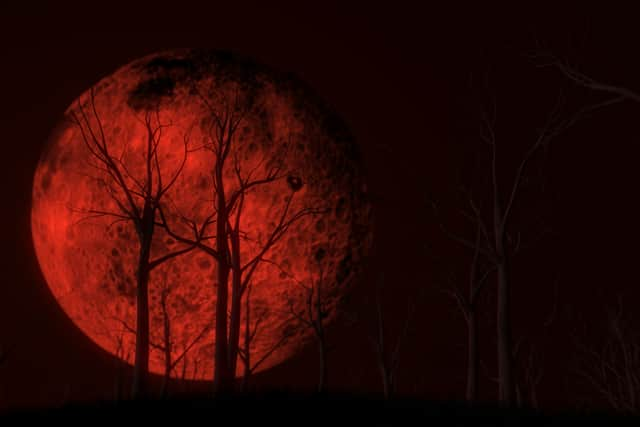Lunar eclipse 2022: when is the Blood Moon, will it be visible in the UK and how to watch
and live on Freeview channel 276
Stargazers will once again have their eyes on the skies this week as a lunar eclipse is set to take place. During the exciting event the Moon will appear a deep blood-red colour.
This lunar eclipse will be the last of its kind until 2025. The National History Museum explains that during the eclipse the moon will turn red due to the alignment of the moon, sun and the earth. The website says that during the eclipse the colour changes because of how the Sun’s light interacts with the Earth’s atmosphere.
Advertisement
Hide AdAdvertisement
Hide AdThe lunar eclipse will take place on Tuesday (November 8), and is expected to start at 7.02am local time. However, the total lunar eclipse will unfortunately not be visible from the UK, but will be visible from the USA, Canada, South America, Australia and much of Asia.
How to see the Blood Moon in the UK
As stated, the total lunar eclipse will unfortunately not be visible from the UK, and will only be visible from the USA, Canada, South America, Australia and much of Asia. However, many organisations across social media and YouTube will be hosting live streams of the event.
Lowel Observatory will be live streaming the event via their Youtube page from 9am GMT, and 2am MST (their local time).
When is the lunar eclipse taking place?
NASA published a breakdown of the timings for the Lunar eclipse:
Advertisement
Hide AdAdvertisement
Hide Ad- 7.02am GMT – Penumbral eclipse begins – The Moon enters the Earth’s penumbra, the outer part of the shadow. The Moon begins to dim, but the effect is quite subtle
- 8.09am GMT – Partial eclipse begins – The Moon begins to enter Earth’s umbra and the partial eclipse begins. To the naked eye, as the Moon moves into the umbra, it looks like a bite is being taken out of the lunar disk. The part of the Moon inside the umbra will appear very dark
- 9.17am GMT – Totality begins – The entire Moon is now in the Earth’s umbra. The Moon will turn a coppery-red. Try binoculars or a telescope for a better view. If you want to take a photo, use a camera on a tripod with exposures of at least several seconds
- 10.42am GMT – Totality ends – As the Moon exits Earth’s umbra, the red colour fades. It will look as if a bite is being taken out of the opposite side of the lunar disk as before
What is a Blood Moon?
NASA explains: “The blood moon occurs during a total lunar eclipse. During a total lunar eclipse, Earth lines up between the Moon and the Sun. This hides the Moon from the sunlight. When this happens, the only light that reaches the Moon’s surface is from the edges of the Earth’s atmosphere. The air molecules from Earth’s atmosphere scatter out most of the blue light.


“The remaining light reflects onto the Moon’s surface with a red glow, making the Moon appear red in the night sky. The name "blood moon" is also sometimes used for a Moon that appears reddish because of dust, smoke or haze in the sky. And it can be one of the full moons of autumn when the leaves are turning red.”
What is a total lunar eclipse?
Royal Museums Greenwich website states that: “For a total lunar eclipse to happen, all three bodies – the Sun, the Earth and the Moon – lie in a straight line. This means that the Moon passes through the darkest part of the Earth’s shadow – the umbra. But a lunar eclipse isn’t always ‘total’. There are actually three different types of lunar eclipse.”
